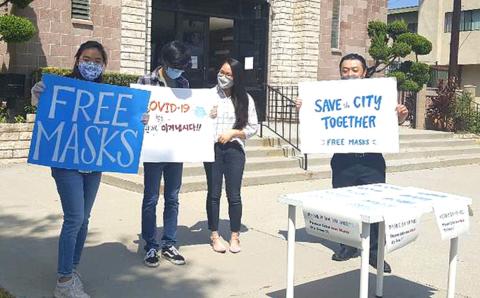Neland Avenue Christian Reformed Church in Grand Rapids, Mich., installed a woman in a same-sex marriage as a deacon last June.
In August, the church’s pastors and council sent a letter of reflection to the congregation explaining how they reached this decision.
Larry Louters, president of the Neland council, told The Banner the church did not specifically choose this path. “Neland was given the gift of LGBTQ+ members with whom we worshiped, members with clear gifts of ministry and leadership, members we loved. We simply worked slowly and prayerfully over the past 10 years to find ways to encourage rather than ignore their gifts.”
The August congregational letter noted that a “2016 survey of positions in the congregation reveal(ed) a broad range of views from traditional (40%) to affirming (40%), and in between (20%).” It acknowledged, “We don’t all agree on SSM (same-sex marriage), or on having a SSM member in leadership. However, we also don’t believe that having a uniform position on this matter is necessary to maintain unity as a body of Christ.”
Advised by Classis
The letter says there was “an extensive study and report by our Nominations Committee in 2019” and that church leadership “requested and received assistance from church advisers from Classis GR East.” It noted a Classis Grand Rapids East 2016 report “that shows a wide range of biblical interpretations one can support with a reformed view of Scripture.”
Al Mulder, stated clerk for Classis Grand Rapids East confirmed to The Banner that “an ad hoc committee of the Neland council requested advisers to meet with them to discuss and advise the committee regarding Neland's nomination process for electing elders and deacons.” Mulder said three ministers served as advisers and submitted a written report, which was received by the classis executive team in December 2019. Mulder said there was an understanding “that Neland would be presenting its own report to classis at such time as they deemed appropriate.” Louters told The Banner the church council “will likely file a report to classis concerning our action this fall.”
The minutes of Classis Grand Rapids East's Sept. 17 meeting note that Neland's congregational letter was presented to classis in its agenda supplement and that the president of classis, Thea Leunk, "invited comments and questions from the floor. None were forthcoming."
The letter says there was “much greater congregational participation in the selection and election of office-bearers this year (2020), and a very strong affirmation vote of all nominees (each received over 87%).”
Synod’s Pastoral Advice
In taking this action, Neland’s council does “not believe we have crossed any line of orthodoxy, only pastoral advice,” the August letter reads. It describes their understanding to be “that all synodical reports and decisions related to homosexuality have been pastoral advice given to the churches (1973, 2002, and 2016).” (Emphasis and parentheses original to the letter.)
Kathy Smith, Calvin Theological Seminary’s adjunct professor of Church Polity, confirmed to The Banner that she explained the same in adult education sessions at Neland, noting Synod 1975’s consideration of “the status of various types of synodical decisions and their relationship to the confessions.”
The report to Synod 1975 said, “All synodical decisions ‘shall be considered settled and binding, unless it is proved that they conflict with the Word of God or the Church Order’ (Art. 29). But there is an obvious difference between the use and function of a pronouncement as interpretation of the confessions and a decision involving ‘guidelines’ or ‘pastoral advice.’ It is the wording of synod's decision that usually indicates the precise character of its decision, and this wording of the decision determines its use and function. No synodical decision involving doctrinal or ethical pronouncements is to be considered on a par with the confessions” (Acts of Synod 1975, p. 598).
“So matters of pastoral advice would not be considered matters of orthodoxy—doctrines found in our confessions—since it is possible to disagree with synod’s positions on matters of pastoral advice, as noted by Synod 1975,” Smith told The Banner in an email.
Questions
In doing this, is Neland getting ahead of synod or breaking CRC rules? The letter says no, but Annetta Vander Lugt, a member of Neland Avenue for 31 years, said she knew that would be a question in the wider denomination. “I think an issue like this isn’t going to change in the denomination unless someone pushes a little, just like happened with women in office. Somebody had to push it a little, and then finally, I think, the denomination changed their stance. I think that’s the kind of thing that could happen here.” Does this decision mean that Neland is an “affirming” church? The letter says Neland members “will continue to be a community with diverse opinions on that” and Vander Lugt appreciates that answer. She said it’s hard to tell whether there are still many varying opinions because she hasn’t experienced people discussing this much and the congregation hasn’t been having as many in-person gatherings because of the COVID-19 pandemic.
Nick Koster, a member of Neland Avenue CRC since 2005 who has served as elder and Sunday School teacher, said “the congregational letter was late in coming.” To him it was "shocking" that accepting a person in a same-sex relationship into church leadership would not be against denominational policy.
Koster said he feels there has been an emphasis on science and social movements in trying to move the church to accept something it has historically judged to be counter to Scripture. He recognizes that we don't know everything, has compassion for those with other views, citing 1 Corinthians 13:12, and looks forward to the day when we will know in full. However, in the meantime, "I'm not going to go along with society and the mockery aimed at Christians because we believe in the traditional biblical view," Koster said.
Michele Dykstra, elected as a deacon at Neland in 2017 and who finished her term in May, left the fellowship of Neland before the August congregational letter was sent. She said she and her family made the decision to leave, though it was painful, out of obedience to God.
To Dykstra, what the congregational letter describes as “Neland’s journey toward LGBT+ inclusion” has been a move away from Scripture. "I don't think that all of a sudden after 2,000+ years of scriptural interpretation that things have suddenly changed. I think that unfortunately our church is following cultural norms and listening to the ways of the world. What we are asked to be is counter cultural. How are we showing God's love by condoning a sin?” Dykstra said.
Dykstra was hesitant to go on record for this article. "The world portrays those of us that interpret Scripture this way as being a hater when I want nothing more than to stand alongside these people and support them. But I want to support them doing the hard thing, which is to obey God and point out his call for celibacy. Our church by doing this completely undermines the LGBT folks who interpret Scripture in the traditional, biblical way,” she said.
Chris Veenstra, a member of Neland since 1992 who has previously served as an elder, described a deliberative process at the church, which he thinks was valuable. "They have done due diligence in terms of bringing certain people to speak with us and not just arbitrarily forging ahead without being deliberate," he said.
Of those who disagree with the decision, Veenstra said, "I can respect where they are coming from, insofar as this isn't an easy call—considering our church history and our historic reading of the Bible. For some people, taking this position means that we are discounting, or re-interpreting, or, in the worst case scenario, rejecting what they believe the Lord is saying. So that's pretty heavy, and one needs to be mindful of that."
The congregational letter noted that the church experienced “lament over the gradual departure of some of our members who felt we needed to nail down either more ‘traditionalist’ or more ‘affirming’ positions.” In the most recent yearbook statistics available (2019), compared to the previous year, Neland decreased in total membership by 23.
About the Author
Alissa Vernon is the news editor for The Banner.








